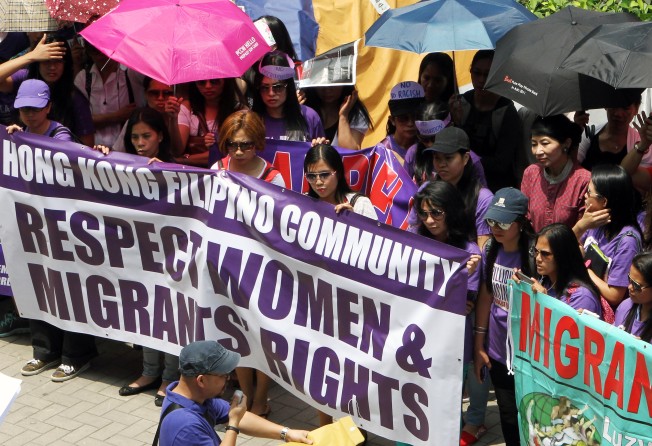Hong Kong domestic helper launches bid to end rule saying she has to live with her employer
Lawyers say the government had no power to impose the ‘live-in’ rule, which stipulates helpers must live in the home they work in

A domestic helper on Tuesday asked a Hong Kong court to grant her and 350,000 others the choice of living apart from their employers, in the first judicial review of the live-in rule imposed since 2003.
Lawyers for Nancy Almorin Lubiano from the Philippines argued the government was acting outside the law in requiring all foreign domestic helpers to reside and sleep in their place of work and employment. They suggested the rule was unconstitutional as it heightened the risk of breaching the fundamental rights of helpers, violating international charters.
Paul Shieh Wing-tai SC, for Lubiano, said their legal challenge was “very narrow”, as they were not calling for all foreign domestic helpers to live away from their employers.
“All we contend for is a choice for the employer to agree to [the helper living] out,” Shieh told the High Court
In the past, Hong Kong had a more liberal regime allowing domestic workers to arrange outside accommodation as long as they obtained consent from their employers and relevant authorities. In 2002, there were about 100 such cases among the 200,000 domestic helpers in the city.
But the situation changed in 2003 when the live-in rule was introduced. It was implemented through standard employment contracts and pledges when helpers applied for visas.
Anyone breaking the rule faces administrative sanctions in future applications for a visa or employment, and criminal prosecution over charges such as furnishing false information, which is punishable by a HK$150,000 fine and 14 years’ imprisonment.
Shieh argued that it was impermissible for the director of immigration to impose measures interfering with the helpers’ daily lives in the name of monitoring their employment.
He said the government’s immigration powers did not extend to stipulating where a person slept or lived as the conditions of stay it imposed should relate to the purpose of the stay and what the person intended to do.
If the director of immigration had no power to impose the live-in rule as a condition of stay, he would similarly lack the power to implement it in a “roundabout way” through contracts, Shieh argued.
“The live-in rule would heighten the risk of rights infringement and enhance the risk of forced labour or servitude,” he continued. “Such a public measure ... has to be justified.”
Shieh noted that the rule met five of the 11 indicators of forced labour identified by the International Labour Organisation: abuse of vulnerability; restriction of movement; isolation; abusive living and working conditions; and excessive overtime.
The claim was supported by a report on 1,003 domestic helpers surveyed by human rights organisation Justice Centre last year, which concluded that the live-in rule had left them “uniquely vulnerable to abuse, exploitation and forced labour”.
Key findings cited by Shieh included an average of 71.4 working hours per week, with more than one in three respondents deprived of their weekly 24-hour rest day as required by law. Another 40 per cent were deprived of independent rooms, some of them exposed to the rest of the household while sleeping in corridors, kitchens and even beds above toilets, Shieh said.
Lubiano herself was given a 60 sq ft room in a 640 sq ft flat shared with a family of three, Shieh revealed. But her room was also used as a storeroom, with its lock removed for the family to enter as they pleased and she was not permitted to close the door.
She had since changed employers.
The two-day hearing continues before Mr Justice Anderson Chow Ka-ming.